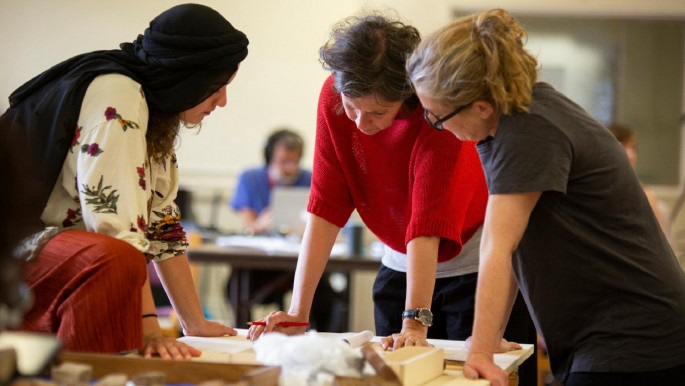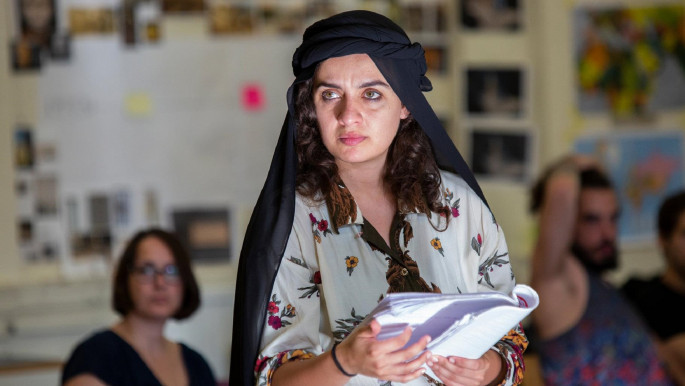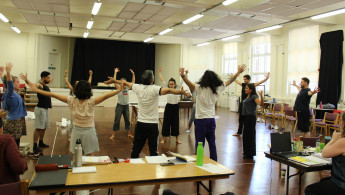Royal Shakespeare Company play interrogates the loss of heritage in contemporary Iraq
The New Arab caught up with playwright Hana Khalil, director Erica Whyman and several members of the cast at RSC's rehearsal space in Clapham, London to learn more about a play that translates on stage one of the darkest chapters of modern Iraqi history.
Who is the museum for? Whose culture are we preserving? And why does it matter when people are dying? Are all questions A Museum in Baghdad challenges us to unwrap the meaning of heritage and to ask what happens when the treasures of an entire country are plundered.
The starting point for Khalil was an exhibition nine years ago at the National Portrait Gallery where she first encountered Gertrude Bell, an Arabist known for her involvement in British-ruled Mesopotamia.
"I loved the idea that she was examining her life and configuring her legacy – using museums, as some of the characters, including Bell, state very directly, as a tool of nationhood, bringing people together".
Miss Bell, also dubbed the female Lawrence of Arabia, is an important fixture in the play "but not the main event" Khalil assures. The play is "not linear" Khalil added.
"One character exists between the times" Abu Zaman "a little Dr Who-ish" she revealed. The overarching focus sheds greater light on how Bell's legacy was undivorceable from Iraq's.
 |
|
| Joe Meehan © |
In essence, Khalil's script narrates a story of nation-building while drawing attention to the tragic ransacking of prized collections at Iraq's National Museum 16 years ago.
Upon entering the rehearsal space, my eyes drift to the backwalls, plastered in mood boards that together form a historical timeline spanning from 1920 to 2006.
The clusters of photographs capture moments of Bell's life in Baghdad, notary figures, alongside stills of excavation sites, indigenous communities and artefacts.
 |
|
| Joe Meehan © |
When asked why "Iraq", director Erica Whyman explains that the story spoke to "Shakespeare's spirit" as a literary giant interested in "the state of his nation" who wrote about "pieces of history, he felt could shine a light on the present moment".
In light of RSC's reputation as an experimental institution, A Museum in Baghdad fits in well within that tradition and repertory. While the play stands independent of existing narratives about the war on Iraq, it also enters into dialogue with them.
 |
|
| Elie Kurrtz © RSC |
"It's not like watching a piece of television about the museum" Whyman says, "You have to be in the room with it".
The museum is an important allegory. In fact, the entire play is set in the museum from start to finish Whyman discloses, while assuring us that audience members will be taken "on a number of flights of imagination".
As the grand visual metaphor, the museum stands both as a symbol of Iraq's colonial past and as a repository of the country's shared historical experiences.
"For me, it becomes a strong metaphor for culture and story" able to address the question of "why" or "do" crumbling objects matter more than human life? Whyman relates this to the urgency, perhaps felt by many Iraqis, for us "to tell our own stories," she says.
The play shuttles between past and present, ancient and modern and at its heart we find strong female protagonists. Bell, played by Emma Fielding is a historic figure, controversial yet revered and whose legacy lives on.
"I love the fact that she's deeply flawed," Fielding says. "Of course she's part of Victorian Empire, in early Edwardian England, imposing a western construct of the nation and borders but she really did have curiosity and deep affection and intellectual understanding of the way tribal systems worked. However misguided, she was trying to work within existing structures and to not be like the French in Syria," she tells The New Arab.
The role animates Bell as not only a kingmaker but in essence a woman that, "towards the end of her life was disappeared out of politics by the rest of her colonial colleagues," Feilding said.
"There are so many things the play deals with, I just hope that people that don't know about Bell or who question her motives, even those troubled by her, will be prompted to go away and find out more."
 |
|
| Joe Meehan © |
Joining Lady Bell on stage, is Iraqi counterpart Ghalia Hussein, a fictional character inspired by the late Iraqi archeologist Lamia al Gailani.
Hussein is a British-educated Iraqi archaeologist who returns to Baghdad in 2003, to rehabilitate a museum whose 7,000 year-old treasures vanished three years prior, during the Anglo-American invasion.
"She returns to Iraq with a feeling of detachment that she wants to put right and do as much as she can, when she's been so absent".
Ghalia and her experience resonates for the actress playing her part, Rendah Heywood.
As an "Iraqi that has grown up in Europe or America watching the history of Iraq as I have, I feel that detachment" she said. "It's a situation that many Arabs find themselves in."
Upon her return, "Hussein finds herself in an impossible job, trying to do an impossible task much like Gertrude."
Each woman, bold and resolute, are agents of change and action whose legacies playwright Hana Khalil fleshes out on stage. By interrogating certain chapters and not the entire lives of both, members of the audience are invited to piece together their own understanding of Iraq's relationship with colonialism and Miss Bell's relationship to Iraq.
The spectacular failure of US forces to protect treasures housed inside The National Museum is another theme scrutinised throughout the play. The deployment of occupational forces ill-equipped to protect the museum is exemplified through the character of Sam York, played by Debbie Korley.
"Of course because of the theatrical setting, it's just me," Korley jokes. The maintenance of order and preventing anyone from entering "as American's tried to redeem museum artefacts" is something audience members will recognise the irony of knowing that Americans stood by idly as 17,000 of the world's finest antiquities were ferreted out of the museum under their protection.
Most fascinating, as Korley interpets, is how York's character, intentionally given an ambiguous name, weighs in on how race operates within the US military.
"As a Londoner looking at the character, it's much wider than I expected," Korley expresses. "Obviously, there's playing an American but also the obvious factor of I'm a black person that perhaps draws on the African American experience and also where I fit in the military. I'm definitely bottom in terms of ranking," she said.
 |
|
| Elie Kurrtz © RSC |
Racial and cultural identities corresponds directly to Khalil's interest in "political plays – when an argument is played out on stage in a literal manner".
The majority of actors cast are of Middle Eastern heritage – Iraqi, Assyrian, Moroccan, Egyptian – whose personal stories and connections have been harnessed in a way that poses a direct challenge to the mis-profiling of Arabs across television and cinema.
Houda Echouafni who plays a young archeologist Layla discussed with The New Arab the power of truthful representations of Arab women on and off screen.
"I'm tired of playing Arab female characters that are written by non-Arab men," Echouafni says, who has starred in numerous films written and directed by and for Arab women.
Layla, Echoufani explains, views the impossible quest of retrieving Iraq's stolen treasures as a fight that Iraqis must lead.
"I guess it's similar to Palestine," she says, "if everyone leaves who's left." Echoufani explains how her character stands in stark contrast to British-educated archaeologist Ghalia. "As someone that lived outside of their home country," she says, "I've had to ask what that means," relating it back Ghalia as a character "not really welcomed upon her return – her expertise is, but her identity as an Iraqi is doubted."
This speaks directly to Hana's experience, in her own words, as someone "constantly challenged if they're Arab enough".
Director Whyman weighs in on her own identity and the importance of acknowledging that.
"Hana is half Palestinian and half Irish and we share some Irish blood, but apart from that, I'm evidently a white and privileged observer of these events so I tried to look a bit at my own history," she told The New Arab.
"There's been a huge need to do research – I wish that weren't so – but for a lot of us in the room we're a minority, the white British creators, which is lovely," adding that even "for her Middle Eastern colleagues we've needed to dig down to understand our history."
"We're taught for starters that civilisation starts in Greece and if you work in theatre that's reinforced," Whyman says. "We are not conscious or knowledgable about where civilization started... where writing started."
 |
|
| Elie Kurrtz © RSC |
Abu Zaman who is played by Rasoul Saghir, an Iraqi-born actor that studied theatre in Baghdad described his involvement in the RSC commissioned play as a dream come true.
Saghir describes Abu Zaman as a "witness to historical events" adding that "he was certainly written with that in mind."
"He's the bridge that joins both time periods," whose "relationship to the museum isn't tangible or expressible."
"It's home for Abu Zaman" who, Saghir reveals is "a bit of a Hakawatt. There's not a single story he cannot recount."
Saghir expressed pride in being part of a wider team that support and complement one another. Language support by Arabic speakers to non-Arabic speakers and vice-versa has been integral to that.
While the play is largely performed in English there are smatterings and verses sung in Arabic. Hearing Arabic spoken "as close to a Baghdadi accent as possible" on stage is what creative director Yasmeen Ghrawi, whose family left Iraq in 2003, is looking forward to most.
Her involvement in the play has unleashed the past, "my memories are coming back to me," she says and "I'm discovering Iraq again, ancient history, and my relationship to Baghdad."
The play works to deliver a simple yet contagious truth that without the keys to our past, we're lost, locked out of our heritage. Although the government of Iraq continues to recover looted antiquities, the black market continues to absorb them. This is an ongoing tragedy that the play addresses both inventively and responsibly but leaves the central question of "do artefacts ever matter more than human life" unanswered.
Nazli Tarzi is a freelance British-Iraqi journalist, specialising in Middle East politics, with a particular interest in Iraqi affairs.
Follow her on Twitter: @NazliTarzi



